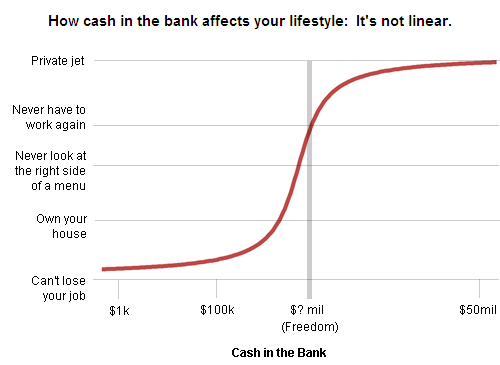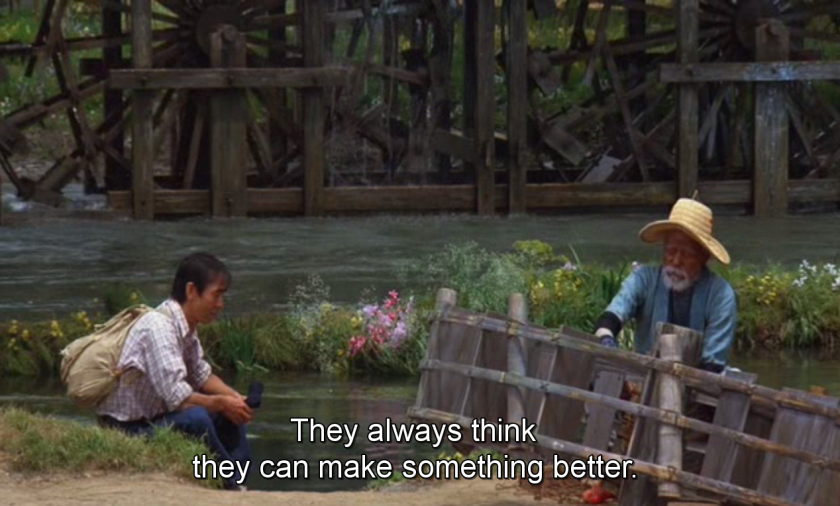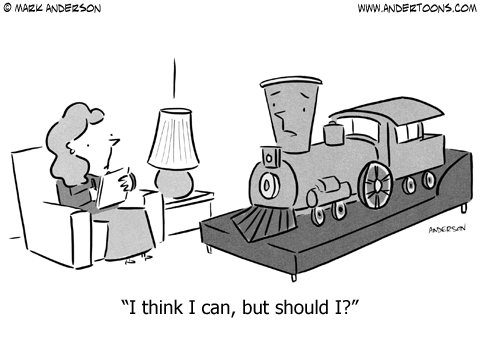
Though many argue that the internet is lowering the quality of conversation and devolving into mere soundbites, I read a swath of incisive and thoughtful longform articles and essays in 2017.
It seems more accurate to me that content on the internet seems to be a barbell with both more high quality and low quality content.
One side of the barbell may be a sea of “9 Things No One Tells You About Having A Cat. You Won’t Believe Number 5” but the other side seems to be an incredible collection of insightful writing that would have been much harder to find in the pre-internet era.
I didn’t necessarily agree with all the opinions expressed in each piece, but they all forced me to think. I hope they’ll do the same for you.
You can also sign up for a curated monthly newsletter of the best things I’m reading (alongside my own articles).
A history of global living conditions in 5 charts
Max Roser
“A recent survey asked “All things considered, do you think the world is getting better or worse, or neither getting better nor worse?”. In Sweden 10% thought things are getting better, in the US they were only 6%, and in Germany only 4%. Very few people think that the world is getting better.What is the evidence that we need to consider when answering this question? The question is about how the world has changed and so we must take a historical perspective. And the question is about the world as a whole and the answer must therefore consider everybody. The answer must consider the history of global living conditions — a history of everyone.”
Stanford study finds walking improves creativity
May Wong
“Stanford researchers found that walking boosts creative inspiration. They examined creativity levels of people while they walked versus while they sat. A person’s creative output increased by an average of 60 percent when walking.”
Why You Will Marry The Wrong Person
Alain De Botton
“Marriage ends up as a hopeful, generous, infinitely kind gamble taken by two people who don’t know yet who they are or who the other might be, binding themselves to a future they cannot conceive of and have carefully avoided investigating.”

A Lesson on Elementary, Worldly Wisdom As It Relates To Investment Management & Business
Charlie Munger
The transcript of a speech given by Charlie Munger in 1994 at USC, I re-read this every year and never fail to gleam something new. It is a treasure trove of wisdom on life, business and investing.
“you have to learn in a very usable way this very elementary math and use it routinely in life — just the way if you want to become a golfer, you can’t use the natural swing that broad evolution gave you. You have to learn — to have a certain grip and swing in a different way to realize your full potential as a golfer.”“To me, it’s obvious that the winner has to bet very selectively. It’s been obvious to me since very early in life. I don’t know why it’s not obvious to very many other people.
Volatility and the Prisoner’s Dilemma
Artemis Capital Management L.P.
“Volatility is about fear… but extreme tail risk is about horror. The Black Swan, as a negative philosophical construct, is when fear ends and horror begins. Fear is something that comes from within our scope of thought. True horror is not human fear in a definable world, but fear that comes from outside what is definable. Horror is about the limitations of our thinking.

Infrastructural Voodoo Doll
Geoff Manaugh
“It might sound like science fiction, but, in 20 years’ time, it could very well be that LAX has a stronger international-intelligence game than many U.S. allies. LAX field agents could be embedded overseas, cultivating informants, sussing out impending threats. It will be an era of infrastructural intelligence, when airfields, bridges, ports, and tunnels have, in effect, their own internal versions of the CIA — and LAX will be there first.”
Against Willpower
Carl Erik Fisher
“a paradigmatic example of reframing is the phenomenon of “temporal discounting,” in which people tend to discount future rewards in favor of smaller immediate payoffs. When offered $5 today versus $10 in a month, many people illogically choose immediate gratification. However, when the question is reframed to make the tradeoffs explicit — “Would you prefer $5 today and $0 in a month or $0 today and $10 in a month?” — more people choose the larger, delayed reward. Research suggests that reframing the question in this way nudges people toward delayed gratification because the different versions of the question employ entirely different cognitive processes. In a neuroimaging study, when the question is edited to explicitly mention $0, not only are the brain’s reward responses reduced, brain activity in the dorsolateral prefrontal cortex (a correlate of effortful self-control) decreases as well.5 A conscientious reframing of a problem in this manner would certainly be an example of willpower, but it would not fall into the conventional understanding of the term. Rather than relying on an effortful fight against impulses, this kind of willpower has the individual completely reimagine the problem and avoid the need to fight in the first place.”
A Cascade of Sand: Complex Systems in a Complex Time
Farnam Street
“Ramo outlines strategies he believes will help us become more Antifragile, he calls this “Deep Security”.
This article pairs nicely with a book I really enjoyed last year, Per Bak’s How Nature Works.

Rich vs. King in the Real World: Why I sold my company
Jason Cohen
“this is a Freedom Line — freedom from restrictions about what you can do with your life, family, and career”
The Cult of Early Retirement Meets (Or Strangely, Doesn’t Meet) The Cult of Entrepreneurship
Dan Andrews
“if our money could be compounded in the stock market by third parties why couldn’t we compound it with our own effort? Why not be financially responsible and cut out the middleman?”
Why Amazon is Eating the World
Zack Kanter
“Amazon is the most defensible company on earth, and we haven’t even begun to grasp the scale of its dominance”
The Science of Inequality: Why People Prefer Unequal Societies
In a thought-provoking new paper, three Yale scientists argue it’s not inequality in life that really bothers us, but unfairness.
An In-Depth Guide to Selling your Business
Andrew Youderian
“I had a painful realization halfway through the process of selling my second business that I want to highlight so it’s not a shocker for you. Put briefly, selling a business hurts your ability to generate cash flows, even if you reinvest the funds in another asset.”
The Rise of Non “VC Compatible” Saas Companies
Clement Vouillon
“Bootstrapping a SaaS to several million dollars of ARR is an increasingly viable path”

The Second Story Of Echo And Narcissus
The Last Psychiatrist
if no one ever seems right for you, and then the one person who does seem right doesn’t want you, the problem is you.
You and Your Research
Richard Hamming
At a seminar in the Bell Communications Research Colloquia Series, Dr. Richard W. Hamming, a Professor at the Naval Postgraduate School in Monterey, California and a retired Bell Labs scientist, gave a very interesting and stimulating talk, `You and Your Research’ to an overflow audience of some 200 Bellcore staff members and visitors at the Morris Research and Engineering Center on March 7, 1986. This talk centered on Hamming’s observations and research on the question “Why do so few scientists make significant contributions and so many are forgotten in the long run?’’ From his more than forty years of experience, thirty of which were at Bell Laboratories, he has made a number of direct observations, asked very pointed questions of scientists about what, how, and why they did things, studied the lives of great scientists and great contributions, and has done introspection and studied theories of creativity. The talk is about what he has learned in terms of the properties of the individual scientists, their abilities, traits, working habits, attitudes, and philosophy.
Amazon’s New Customer
Stratechery
“Amazon has no desire to be a grocer, and contrary to conventional wisdom the company is not even a retailer”
The Evolution Of Trust
Nicky Case
A really cool interactive game that helped me understand how Trust works in the modern world and the game theory that explains it.
I know, but this is on is sort of cheating, because it’s not article, but it’s my list and I’m including it anyway because I liked it so much. 🙂

Have Smartphones Destroyed a Generation?
Jean M. Twenge
“First we shape our tools, thereafter, our tools shape us”
How You Know
Paul Graham
“Reading and experience train your model of the world. And even if you forget the experience or what you read, its effect on your model of the world persists. Your mind is like a compiled program you’ve lost the source of. It works, but you don’t know why.”

Return of the city-state
Jamie Bartlett
“But the nation-state with its borders, centralised governments, common people and sovereign authority is increasingly out of step with the world. And as Karl Marx observed, if you change the dominant mode of production that underpins a society, the social and political structure will change too.”
Why The Elites Always Rule
Hugo Drochon
“The term élite, used in its current sociological sense, first appeared in his 1902 book Les systèmes socialistes (“socialist systems”). Its aim was to analyse Marxism as a new form of “secular” religion. And it was the French word élite that he used: naturally, one might say, for a book written in French.”
The Bear Case For Crypto
Preston Byrne
I have been firmly against ICOs since before the day I started a venture of my own in the space, back in 2014 when my company was walking door-to-door visiting every bank in London and competing with a certain ICO-funded project named Ethereum for attention and budget. I remain opposed to most ICOs today. And I am bearish on their future.

Man as a Rationalist Animal
Samzdat
A summary and analysis of Seeing Like a State (my own notes here) in light of our current political situation. A good argument for why and how groups are talking past each other.
Things to Hang on Your Mental Mug Tree
Edge
Rory Sutherland manages to be both a funny and insightful observer. This Edge conversation brings out both with lines like “it’s far easier to be fired for being illogical than it is for being unimaginative.” If you enjoy this article, his interview on Farnam St. is a great follow up.
Defining Aggregators
Stratechery
If you’re interested in understanding how the internet works, there’s simply no better analyst than Ben Thompson. Aggregation theory (defined in this article and in another eponymously-titled 2015 article) is perhaps his core insight. An essential framework for understanding the internet era.
Days of Rage
davidzhines
A book review of Bryan Burrough’s Days of Rage covering the domestic violence of the 1970s and asks whether we aren’t headed towards a similar world in 2017.
“People have completely forgotten that in 1972 we had over nineteen hundred domestic bombings in the United States.” — Max Noel, FBI (ret.)
Moderately terrifying.

Are We on the verge of a New Golden Age?
Carlota Perez, Leo Johnson, and Art Kleiner
A long-wave theory of technological and economic change suggests the financial malaise that began in 2007 may be about to end. (Carlotta Perez’s theory)
Resisting Reduction
Joi Ito
The Head of the MIT Media Lab weighs in on the Singularity and how me must resist reductionist thinking in designing out future.
The Web Began Dying in 2014, Here’s How
André Staltz
“It looks like nothing changed since 2014, but Google and Facebook now have direct influence over 70%+ of internet traffic.”
A Measure of Sacrifice
Nick Szabo
One of the most influential things I’ve read about about cryptocurrency, that pairs well with this article on institutional cryptoeconomics.
They argue that the most similar invention to the blockchain is the mechanical clock. Both technologies allowed society to track a resource theretofore that could not be measured. In the case of the clock, this served to restructure society facilitating a shift from slavery/serfdom to wage labor because you could measure how long someone worked now.
The blockchain allows us to account for many resources we could not previously measure (e.g. the Basic Attention Token) lets us measure and create a market for attention). Might it restructure society in as fundamental a way as the clock? What would that even look like?

The Western Elite from a Chinese Perspective
Puzhong Yao
“I went to the career service office and told them that my primary goal after the MBA was to make money. I told them that $500,000 sounded like a good number. They were very confused, though, as they said their goal was to help me find my passion and my calling. I told them that my calling was to make money for my family. They were trying to be helpful, but in my case, their advice didn’t turn out to be very helpful.”
Hilarious and insightful.
Logical emergence of money from barter
Nick Szabo
A history of how money emerged from barter that forms the best argument I’ve heard for why micro payments will never work.
“Sufficiently high mental transaction costs are sufficient to cause the emergence of a currency standard, even in the absence of storage and transport costs.”
Mimi O’Donnell Reflects on the Loss of Philip Seymour Hoffman and the Devastation of Addiction
Mimi O’Donnell
A beautiful and tragic reflection on addiction and death.
Interested in more articles about innovation, productivity, and the blockchain?
Click here to sign up to my monthly newsletter to receive the latest from around the web.
Last Updated on July 30, 2019 by Taylor Pearson


